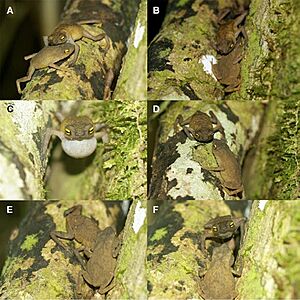Frost's toad facts for kids
Quick facts for kids Frost's toad |
|
|---|---|
 |
|
| Interactions between two males | |
| Conservation status | |
| Scientific classification | |
| Synonyms | |
|
Atelopus pernambucensis Bokermann, 1962 |
The Frost's toad, also known as Frostius pernambucensis, is a type of toad that belongs to the Bufonidae family. This special toad lives only in the eastern part of Brazil. You can find it in the states of Paraíba, Pernambuco, Alagoas, and eastern Bahia.
Contents
What Does the Frost's Toad Look Like?
Size and Appearance
Adult male Frost's toads are quite small. In 2008 and 2009, males found in Santa Teresinha, Bahia, measured about 2.8 to 3.7 centimeters (about 1 to 1.5 inches) from their snout to their rear end.
Their ears (called tympanums) are small and shaped like a tall oval. Their fingers and toes are long and have special pads that help them grip surfaces. The toad's skin, both on its back and belly, is usually brown or light brown. Its eyes have bright yellow irises.
Sounds They Make
Male Frost's toads make a special sound to attract females. This sound is a long, pulsed call that lasts about eight seconds. It has about seven pulses every second. They repeat this call about twice every minute.
Habitat and Reproduction
Where They Live
The Frost's toad lives in both untouched (primary) and regrowing (secondary) forests. They can be found at heights up to 800 meters (about 2,600 feet) above sea level. These toads often live inside bromeliad plants, which are like large air plants, or among the fallen leaves on the forest floor.
How They Reproduce
For the Frost's toad, bromeliad plants are very important for reproduction. This is where the female toads lay their eggs. Male toads will call out to females while sitting on plants, usually between 0.2 and 2.5 meters (about 8 inches to 8 feet) above the ground. Sometimes, males might also use visual signals or even fight with other males to win over a female.
Conservation Status
Threats to Their Home
Sadly, the Frost's toad is facing threats to its survival. Its home, the forest, is being destroyed. This happens because of things like farms expanding, animals grazing, trees being cut down (clear-cutting), new tree plantations, and people building homes. Also, people sometimes collect bromeliads, which takes away the toads' homes and breeding spots.
Protected Areas
The good news is that the Frost's toad can be found in several protected areas. These areas help keep their habitats safe and give them a better chance to survive and thrive.


